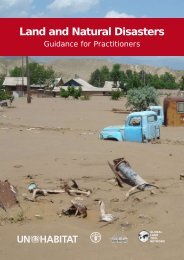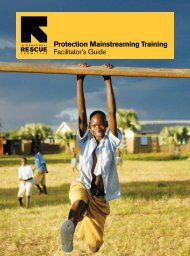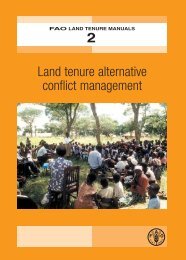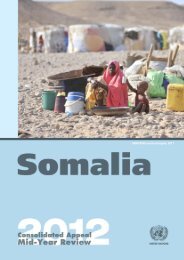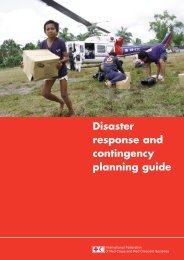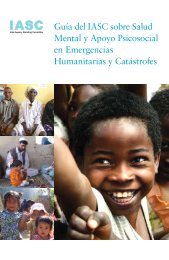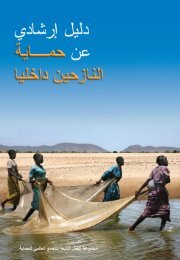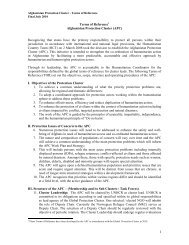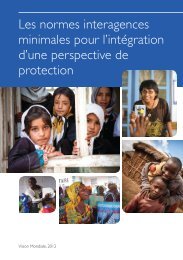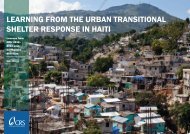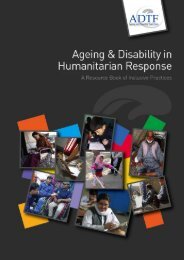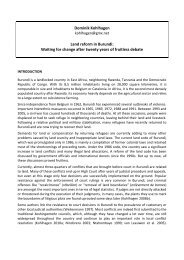Inter-Agency Real Time Evaluation of the Response to Cyclone Nargis
Inter-Agency Real Time Evaluation of the Response to Cyclone Nargis
Inter-Agency Real Time Evaluation of the Response to Cyclone Nargis
Create successful ePaper yourself
Turn your PDF publications into a flip-book with our unique Google optimized e-Paper software.
season, which impacts a number <strong>of</strong> clusters and working groups, notably WASH, shelter, health andlivelihoods. The WASH cluster developed a dry season water strategy in early Oc<strong>to</strong>ber and <strong>the</strong>health cluster has started providing support, but <strong>the</strong> team’s judgment was that a coherent, crosscuttingapproach could help address this issue more systematically.Clusters were established in Bangkok during <strong>the</strong> initial weeks <strong>of</strong> <strong>the</strong> response. As manyorganizations deployed staff <strong>to</strong> Bangkok in anticipation <strong>of</strong> entering Myanmar, <strong>the</strong> regional centerbecame a coordination hub ‘in exile’.Those interviewees who participated in <strong>the</strong>se general coordination fora and cluster meetings allindicated that <strong>the</strong>y had been useful. A Bangkok-based NGO worker likened regional clusters <strong>to</strong>“wasps in a jar”. However, <strong>the</strong> clusters in Bangkok were not seen by Myanmar-based keyinformants as having a substantive role, with <strong>the</strong> notable exception <strong>of</strong> <strong>the</strong> logistics cluster whichestablished and operated <strong>the</strong> air bridge. O<strong>the</strong>rwise, <strong>the</strong> main benefit <strong>of</strong> <strong>the</strong>se clusters was perceivedby participants as facilitating information flow and as a way <strong>of</strong> releasing pent-up energy <strong>of</strong> aidworkers waiting <strong>to</strong> be deployed <strong>to</strong> Myanmar.3.4.1 Cluster RecommendationsR.4. OCHA and <strong>the</strong> <strong>Inter</strong> Cluster Coordina<strong>to</strong>r should facilitate discussions within each cluster <strong>to</strong>clarify roles and responsibilities. Some areas that need <strong>to</strong> be addressed include:Cluster leads need <strong>to</strong> understand <strong>the</strong>ir accountability for ensuring effective clustercoordination through <strong>the</strong>ir counterparts in each hub in <strong>the</strong> Delta, not only in Yangon.More resources should be dedicated <strong>to</strong> supporting and training hub level coordination,including cluster leads spending more time in <strong>the</strong> field; andRa<strong>the</strong>r than merely forwarding recommendations/complaints from <strong>the</strong> field, clustersneed <strong>to</strong> improve <strong>the</strong>ir accountability systems so that <strong>the</strong>y can moni<strong>to</strong>r whe<strong>the</strong>r <strong>the</strong>yhave been acted upon and provide regular feedback <strong>to</strong> <strong>the</strong>ir counterparts in <strong>the</strong> fieldand communities.R.5.The HC should oversee a review and rationalization <strong>of</strong> <strong>the</strong> current cluster system, usingdesired outcomes at community level as <strong>the</strong> primary focus. Key areas for review include:DRR should be strategically integrated throughout clusters. All cluster strategiesshould incorporate contingency plans;Look for appropriate opportunities <strong>to</strong> incorporate in<strong>to</strong> national systems (e.g.education); andStart developing a phase-out strategy for clusters based on a mapping <strong>of</strong> coordinationmechanisms. It is useful <strong>to</strong> do this at this stage, since this will help <strong>to</strong> guideapproaches <strong>to</strong> coordination with more immediate priorities such as livelihood andDRR.R.6.R.7.Discussions on livelihoods should be consolidated, possibly as a single cluster in support <strong>of</strong><strong>the</strong> PONREPP process. Ad hoc technical working groups will still be required, but it will beimportant that <strong>the</strong>re is a focal point accountable whose role is <strong>to</strong> ensure that livelihoodrecovery in <strong>the</strong> Delta is approached in a coherent fashion;Outreach from <strong>the</strong> clusters and <strong>the</strong> humanitarian community should be reinforced whilereducing reliance on meetings as a primary coordination mechanism. The HC shoulddesignate OCHA <strong>to</strong> lead development <strong>of</strong> a communication strategy with clear feedback21



